Spark plugs
Fuel Additives
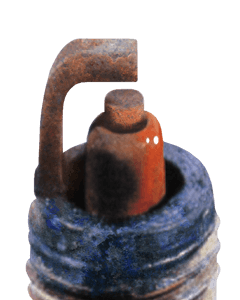
- Appearance: Reddish/brown or purple deposits/coloration on the core nose insulator
- Cause: Use of fuel additives
- Effect: Misfire. Normally additives are non-conductive; however, some are and if the deposit build up is excessive it can create an earth leakage path for the spark
- Remedy: Replace spark plugs and ensure that any additives used are compatible with the engine manufacturer’s ignition and emission systems and added in the correct proportion
Worn-out Spark Plug
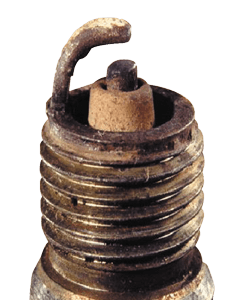
- Appearance: Centre and/or ground electrodes are rounded and the gap is excessive
- Cause: General wear (spark plug has come to the end of its life). However, the greyish tan/white colour indicates that the plug is the correct heat range and also that the fuel/ignition systems and engine are generally in good condition
- Effect: An increased gap will multiply the workload on the ignition system and may cause misfire, poor fuel economy, and damage to other ignition components.
- Remedy: Replacement is recommended with new plug of the same heat range
Ash Deposits
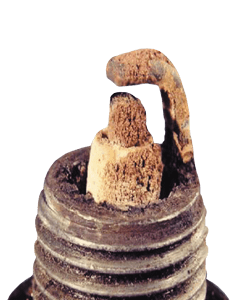
- Appearance: Light brown deposits encrusted on the centre and/or ground electrode
- Cause: Often due to excessive fuel (or oil) additives, however, general engine wear can have a similar effect on the spark plug
- Effect: Ash deposits can ‘shield’ the spark, leading to misfire problems
- Remedy: Ensure plug is of the proper heat range and check for engine wear
Pre-ignition
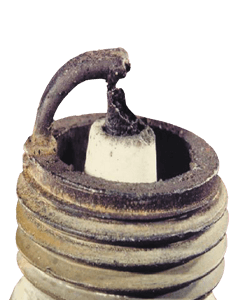
- Appearance: Melting (or partial melting) of the ground and/or central electrode
- Cause: Spark plug too hot, air fuel mixture excessively lean, incorrect ignition advance, defective exhaust re-circulation system, faulty detonation sensor, cross induction in the spark plug leads or worn engine components
- Effect: In extreme cases engine damage will result
- Remedy: Identify the cause and rectify. Replace spark plugs in line with manufacturer’s recommendation
Corona Discharge Stain
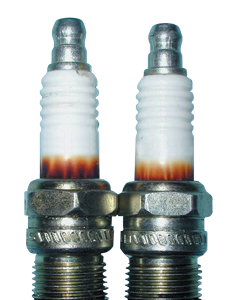
- Appearance: Discoloration of the ceramic insulator, near to the shell
- Cause: Particles of oil/gas (in the spark plug well), becoming attracted to the ceramic by the magnetic field created by the high voltage current flowing through the spark plug
- Effect: Not detrimental to spark plug operation
- Remedy: Ensure that spark plug “well” is clean when installing new spark plugs
Overheating
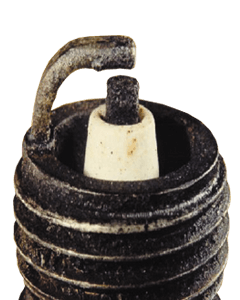
- Appearance: Chalky white insulator (with no tan colouring) pitted or blistered electrodes. In some cases the insulator will begin to turn grey or dark blue
- Cause: Improper heat range plug, lean air fuel mixture, incorrect ignition timing, insufficient plug tightening torque and general engine overheating
- Effect: General poor running conditions
- Remedy: Identify the cause of overheating and rectify. Replace spark plugs in line with manufacturer’s recommended heat range
Oil Fouling
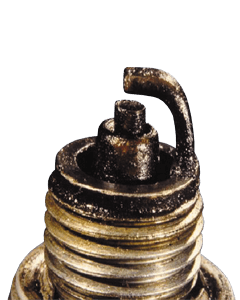
- Appearance: Firing end of spark plug is ‘wet’ with lubricating oil
- Cause: Usually a sign of advanced engine wear (excessive volumes of oil in the combustion chamber), oil fouling can also be caused by a fault in the crankcase breather system
- Effect: Misfire due to oil deposits covering the firing end of the plug preventing the spark from ‘jumping the gap’
- Remedy: Rectify the cause of excessive oil in the combustion chamber and replace spark plugs
Cold/Carbon Fouling
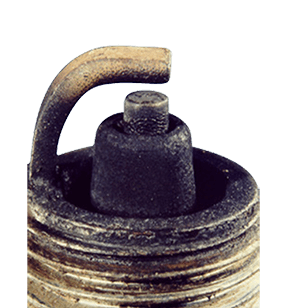
- Appearance: Soft, black, sooty deposits on the firing end of the plug
- Cause: Rich air-fuel mixture, weak ignition, spark plug too cold or repetitive short journeys
- Effect: Carbon deposits are conductive and can create earth leakage paths, often resulting in misfire problems which can lead to catalyst damage
- Remedy: Check fuel & ignition systems, general engine performance and driving style before plug replacement. Confirm that the spark plug (part number) is correct for the application
Flash Over
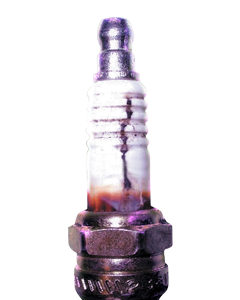
- Appearance: Black burn marks (carbon tracks) running vertically down the spark plug insulator towards the shell
- Cause: Current discharge from the top terminal of the spark plug, down the outside of the insulator to earth; due to poor fitting/worn spark plug boot
- Effect: Engine misfire
- Remedy: Replace the affected plug(s) and plug lead(s)
Detonation
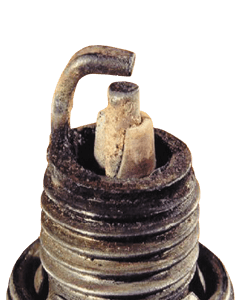
- Appearance: Light detonation will cause black/grey spots on the insulator or ground electrode. Severe detonation can crack or even break the insulator or ground electrode
- Cause: Abnormal combustion, causing pressure spikes/shock waves in the combustion chamber. Can result from: inoperative exhaust gas re-circulation system, defective detonation sensor, lean air fuel mix, incorrect fuel octane rating or spark advance and loose fitted spark plugs
- Effect: Misfire and/or general poor/ uneven running which may result in engine damage
- Remedy: Identify the cause and replace the spark plugs
Spark Plug Tightening
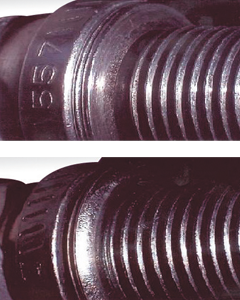
- Appearance: Spark plug gasket has not been sufficiently crushed (see photographs)
- Cause: Incorrect tightening of the spark plug
- Effect: If the plug is too loose,correct heat dissipation will be prevented, resulting inoverheating of the plug which can lead to pre-ignition or detonation problems. Conversely, if the plug is too tight, damage may result to the insulator and internal components causing operating problems
- Remedy: Tighten spark plugs to the manufacturer’s recommended torque value
Normal Spark Plug Wear/Operation
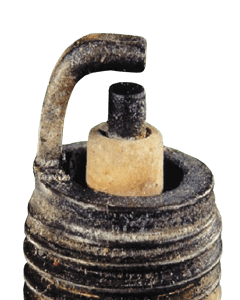
- Appearance: Greyish tan to white colour around the insulator, at the firing end
- Cause: Confirms that the spark plug is the appropriate heat range and has been firing correctly. Also indicates that the fuel and ignition systems are working efficiently and the engine is mechanically sound
- Remedy: None required other than to check the spark plug gap and replace in line with manufacturer’s recommendations
Fuel Additives

- Appearance: Reddish/brown or purple deposits/coloration on the core nose insulator
- Cause: Use of fuel additives
- Effect: Misfire. Normally additives are non-conductive; however, some are and if the deposit build up is excessive it can create an earth leakage path for the spark
- Remedy: Replace spark plugs and ensure that any additives used are compatible with the engine manufacturer’s ignition and emission systems and added in the correct proportion
Worn-out Spark Plug

- Appearance: Centre and/or ground electrodes are rounded and the gap is excessive
- Cause: General wear (spark plug has come to the end of its life). However, the greyish tan/white colour indicates that the plug is the correct heat range and also that the fuel/ignition systems and engine are generally in good condition
- Effect: An increased gap will multiply the workload on the ignition system and may cause misfire, poor fuel economy, and damage to other ignition components.
- Remedy: Replacement is recommended with new plug of the same heat range
Ash Deposits

- Appearance: Light brown deposits encrusted on the centre and/or ground electrode
- Cause: Often due to excessive fuel (or oil) additives, however, general engine wear can have a similar effect on the spark plug
- Effect: Ash deposits can ‘shield’ the spark, leading to misfire problems
- Remedy: Ensure plug is of the proper heat range and check for engine wear
Pre-ignition

- Appearance: Melting (or partial melting) of the ground and/or central electrode
- Cause: Spark plug too hot, air fuel mixture excessively lean, incorrect ignition advance, defective exhaust re-circulation system, faulty detonation sensor, cross induction in the spark plug leads or worn engine components
- Effect: In extreme cases engine damage will result
- Remedy: Identify the cause and rectify. Replace spark plugs in line with manufacturer’s recommendation
Corona Discharge Stain

- Appearance: Discoloration of the ceramic insulator, near to the shell
- Cause: Particles of oil/gas (in the spark plug well), becoming attracted to the ceramic by the magnetic field created by the high voltage current flowing through the spark plug
- Effect: Not detrimental to spark plug operation
- Remedy: Ensure that spark plug “well” is clean when installing new spark plugs
Overheating

- Appearance: Chalky white insulator (with no tan colouring) pitted or blistered electrodes. In some cases the insulator will begin to turn grey or dark blue
- Cause: Improper heat range plug, lean air fuel mixture, incorrect ignition timing, insufficient plug tightening torque and general engine overheating
- Effect: General poor running conditions
- Remedy: Identify the cause of overheating and rectify. Replace spark plugs in line with manufacturer’s recommended heat range
Oil Fouling

- Appearance: Firing end of spark plug is ‘wet’ with lubricating oil
- Cause: Usually a sign of advanced engine wear (excessive volumes of oil in the combustion chamber), oil fouling can also be caused by a fault in the crankcase breather system
- Effect: Misfire due to oil deposits covering the firing end of the plug preventing the spark from ‘jumping the gap’
- Remedy: Rectify the cause of excessive oil in the combustion chamber and replace spark plugs
Cold/Carbon Fouling

- Appearance: Soft, black, sooty deposits on the firing end of the plug
- Cause: Rich air-fuel mixture, weak ignition, spark plug too cold or repetitive short journeys
- Effect: Carbon deposits are conductive and can create earth leakage paths, often resulting in misfire problems which can lead to catalyst damage
- Remedy: Check fuel & ignition systems, general engine performance and driving style before plug replacement. Confirm that the spark plug (part number) is correct for the application
Flash Over

- Appearance: Black burn marks (carbon tracks) running vertically down the spark plug insulator towards the shell
- Cause: Current discharge from the top terminal of the spark plug, down the outside of the insulator to earth; due to poor fitting/worn spark plug boot
- Effect: Engine misfire
- Remedy: Replace the affected plug(s) and plug lead(s)
Detonation

- Appearance: Light detonation will cause black/grey spots on the insulator or ground electrode. Severe detonation can crack or even break the insulator or ground electrode
- Cause: Abnormal combustion, causing pressure spikes/shock waves in the combustion chamber. Can result from: inoperative exhaust gas re-circulation system, defective detonation sensor, lean air fuel mix, incorrect fuel octane rating or spark advance and loose fitted spark plugs
- Effect: Misfire and/or general poor/ uneven running which may result in engine damage
- Remedy: Identify the cause and replace the spark plugs
Spark Plug Tightening

- Appearance: Spark plug gasket has not been sufficiently crushed (see photographs)
- Cause: Incorrect tightening of the spark plug
- Effect: If the plug is too loose,correct heat dissipation will be prevented, resulting inoverheating of the plug which can lead to pre-ignition or detonation problems. Conversely, if the plug is too tight, damage may result to the insulator and internal components causing operating problems
- Remedy: Tighten spark plugs to the manufacturer’s recommended torque value
Normal Spark Plug Wear/Operation

- Appearance: Greyish tan to white colour around the insulator, at the firing end
- Cause: Confirms that the spark plug is the appropriate heat range and has been firing correctly. Also indicates that the fuel and ignition systems are working efficiently and the engine is mechanically sound
- Remedy: None required other than to check the spark plug gap and replace in line with manufacturer’s recommendations